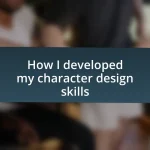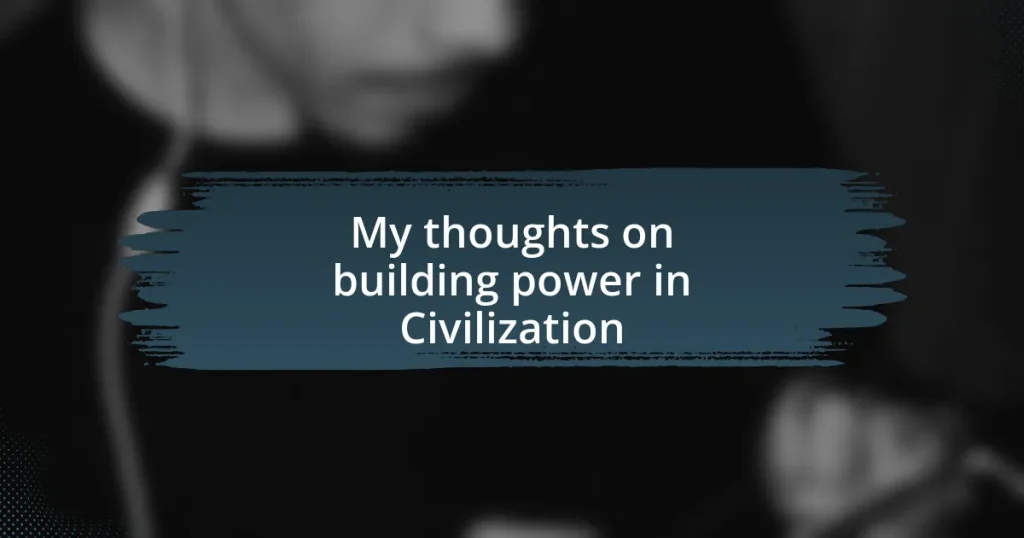Key takeaways:
- Power dynamics are shaped through interactions, relationships, and empathy within societies, emphasizing the importance of leaders who understand their constituents.
- Early game strategies for building power in civilization include strong agriculture, forming alliances, and investing in technology and military.
- Military power is essential for national security and economic growth but should be used responsibly for peacekeeping rather than domination.
- Diplomacy is a vital tool for nations, fostering long-term relationships through negotiation and collaboration rather than military intervention.
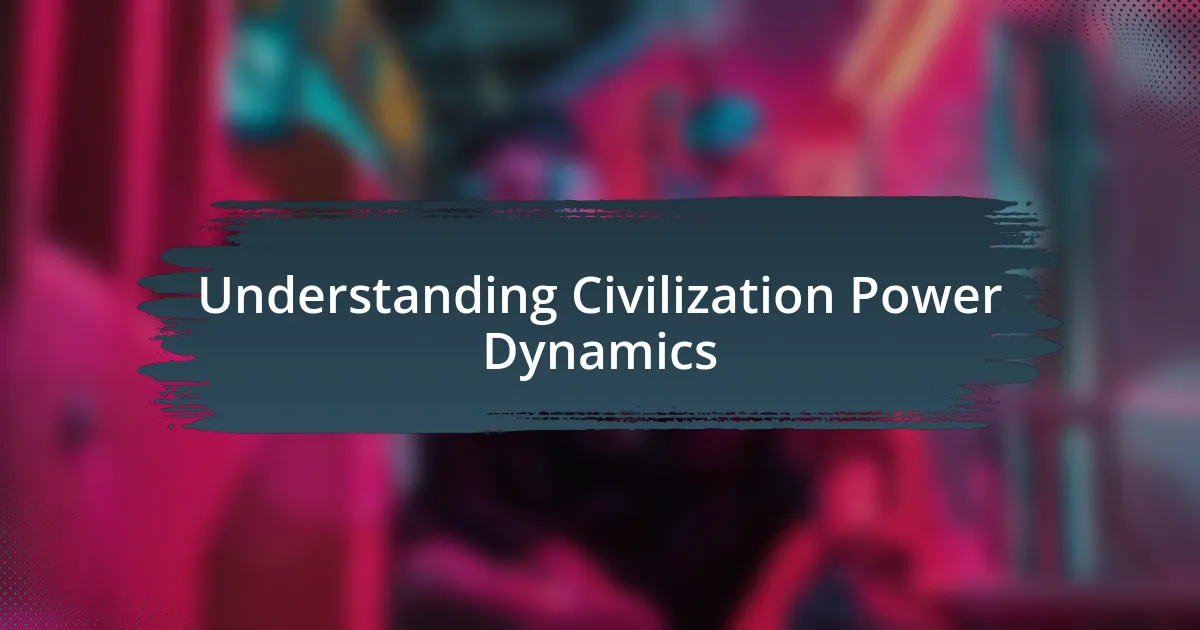
Understanding Civilization Power Dynamics
Power dynamics in civilization can be fascinating to explore. I often reflect on how power is not merely held but is shaped through interactions and relationships within society. For instance, in my experience, I’ve seen communities thrive when local leaders empower their members, fostering an environment where everyone feels valued and engaged. How does this principle apply to larger civilizations?
When I think about significant historical figures who rose to power, like leaders during pivotal times, it strikes me how their influence was often tied to the prevailing social structures and cultural expectations. There’s a lesson here about navigating the complexities of power—aligning oneself with collective values can create opportunities for unity rather than division. Have you ever noticed how movements gather strength by resonating with the emotions and aspirations of the people?
I believe understanding these dynamics can illuminate the paths civilizations take. It’s not just about who holds power but how they wield it and the connections they forge. Reflecting on my interactions, I’ve often realized that genuine leadership often stems from empathy and a willingness to listen, rather than just authoritative decree. Isn’t it intriguing how the most powerful leaders often have the deepest understanding of their constituents’ needs?
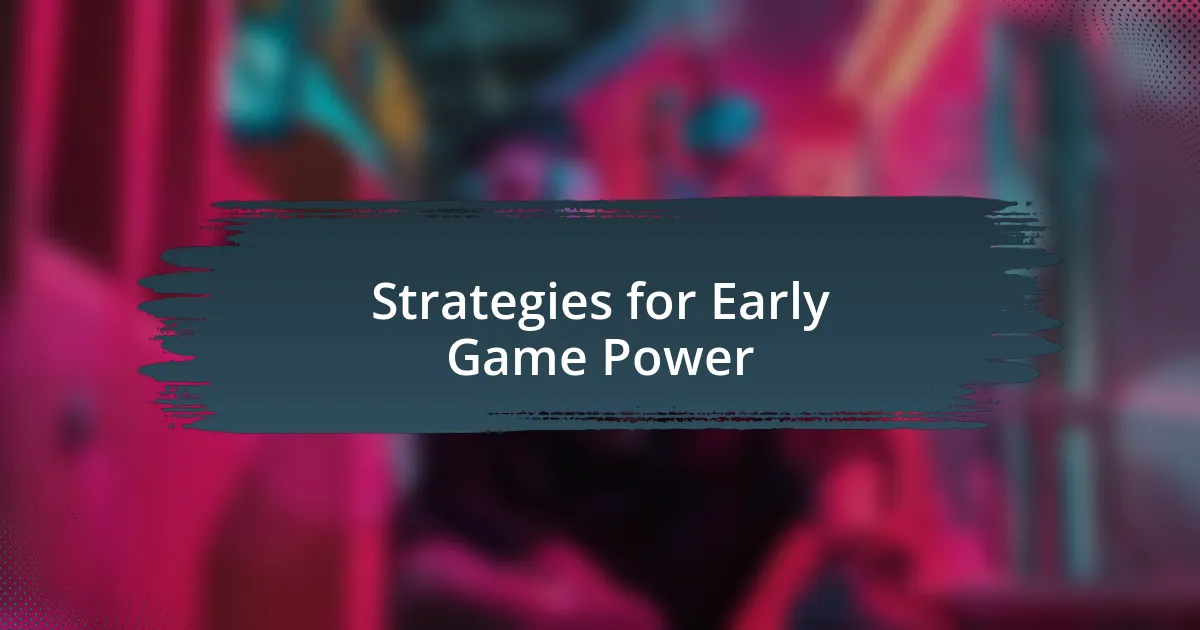
Strategies for Early Game Power
Strategically building power in the early game of any civilization requires a combination of resource management and relationship building. I recall a time when I started a new settlement in a strategy game, and it hit me how essential it was to secure key resources swiftly. By prioritizing food production and establishing trade routes early on, I could create a strong foundation for growth. This experience taught me that power often springs from tangible assets and effective diplomatic ties.
To maximize your power early in a civilization game, consider these strategies:
- Establish strong agriculture to ensure a stable food supply.
- Form alliances with nearby factions to bolster defenses and trade.
- Invest in key technological advancements to gain an edge.
- Focus on building a small but powerful military to deter aggressors.
- Utilize scouts effectively to identify and exploit valuable resources.
With these tactics, you can create a formidable position before the competition heats up.
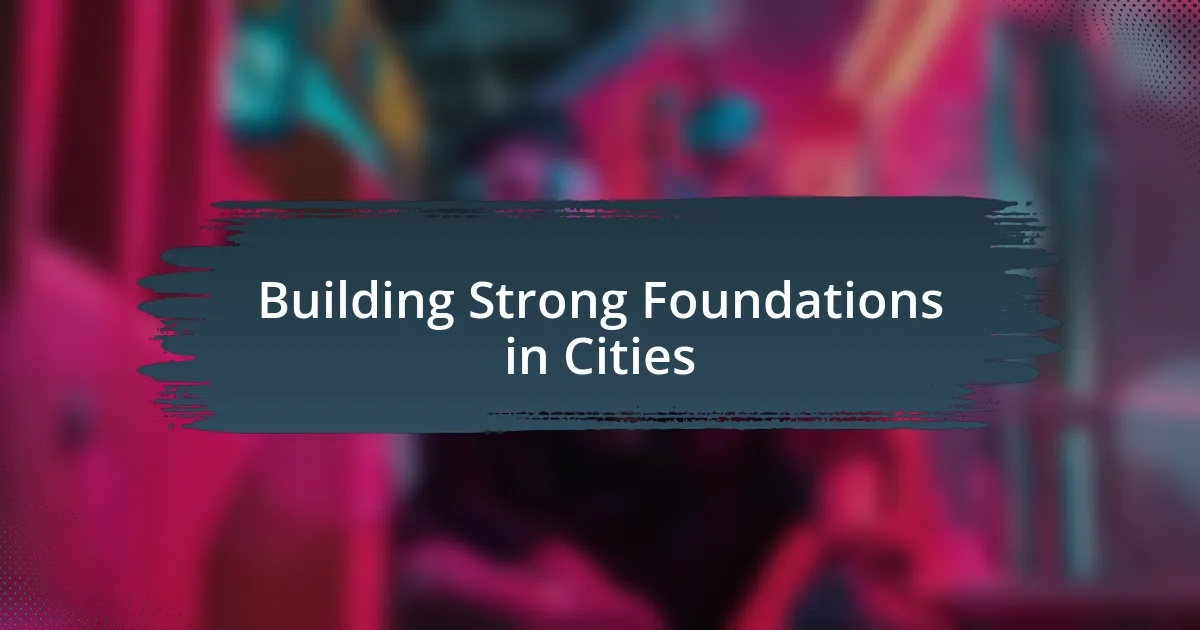
Building Strong Foundations in Cities
Building a strong foundation in cities is about more than just bricks and wood; it’s about creating an environment where growth can thrive. I remember one project where we focused on community spaces first. By prioritizing parks and public areas, we saw not only an improvement in community spirit but also a boost in local businesses. This experience highlighted how an inclusive approach to urban planning can lay the groundwork for a vibrant city.
Strong infrastructure is vital for urban success. In another city I worked with, the decision to invest in reliable public transport made a significant difference. It connected neighborhoods and increased accessibility. This fostered economic growth, as more people could easily commute to work and support local shops. It’s abundantly clear to me that a well-connected city is a city poised for prosperity.
Incorporating sustainable practices during the foundation phase can alleviate future challenges. One city I admire introduced green roofing from the outset. It helped to manage stormwater and allowed for more greenery in urban spaces. Not only did it improve the aesthetic appeal, but it also made a positive impact on the environment. This experience solidified my belief that the choices made in the early stages of city-building resonate long down the line.
| Foundation Element | Impact on City |
|---|---|
| Community Spaces | Enhanced Community Engagement |
| Public Transport | Improved Accessibility and Economic Growth |
| Sustainable Practices | Environmental Benefits and Aesthetics |
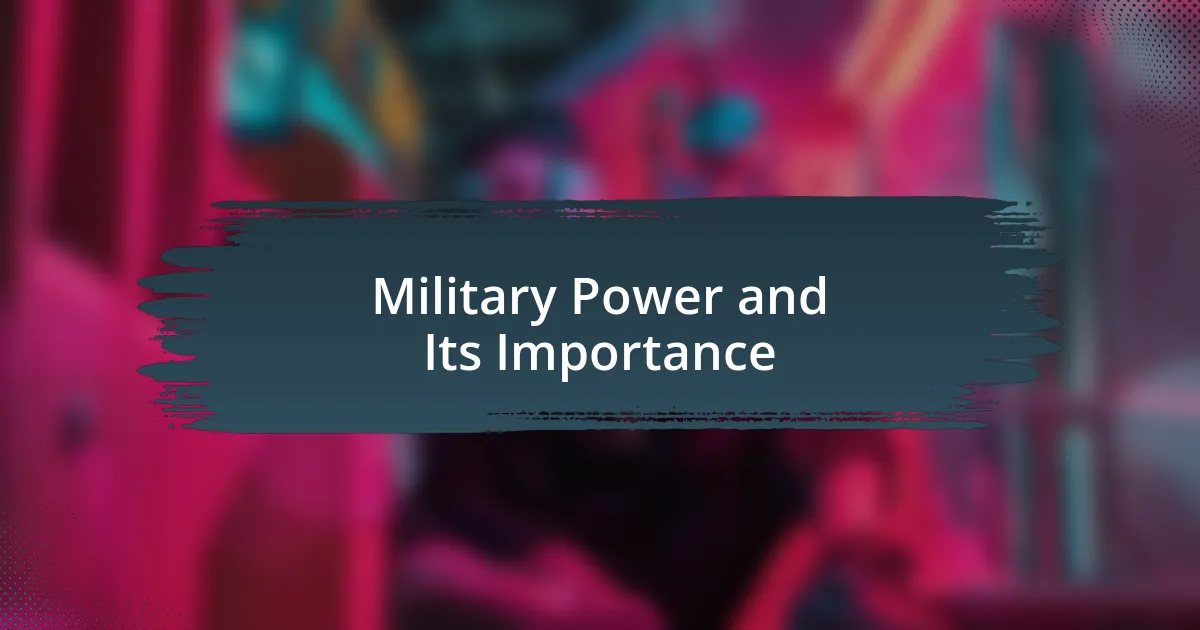
Military Power and Its Importance
Military power is a cornerstone of national security and international influence. I recall a time when I observed how a nation’s military strength directly affected its diplomatic negotiations. The presence of a formidable military can often lead to more favorable terms in international discussions, as countries tend to respect those who can defend their interests effectively.
What struck me was the balance between military power and its ethical implications. It’s essential to ask: how do we ensure that strength is used responsibly? In a project involving defense policy, I saw experts wrestling with this very question. They emphasized that military might should be a tool for peacekeeping and stability rather than domination. This perspective made me realize that responsible military power can help maintain a balance in global relationships.
Finally, I’ve come to value how military power can invigorate a nation economically. Investing in defense technology has often spurred innovation and created jobs, as I witnessed in a region where a military base was established. The ripple effect on local economies was significant, showcasing how military expenditures can lead to broader economic benefits. It’s a fascinating interplay that deserves more attention in discussions about national development strategy.
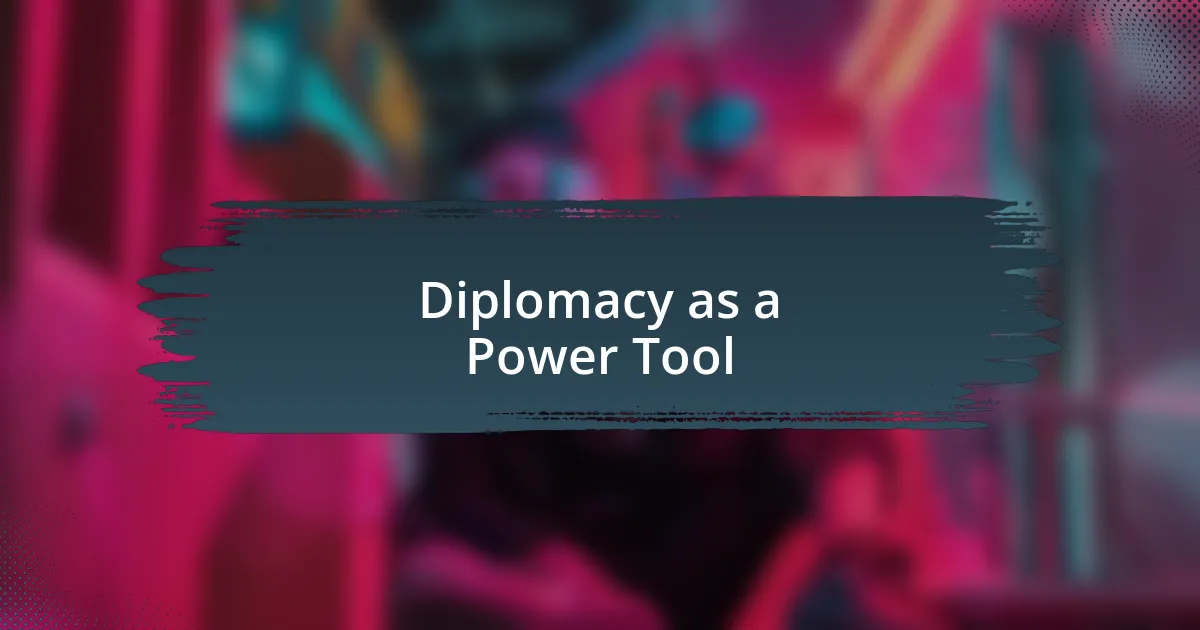
Diplomacy as a Power Tool
Diplomacy often gets overshadowed by military might, yet I believe it is one of the most powerful tools a nation can wield. For instance, I recall attending a conference where diplomats from various countries engaged in discussions that seemed to defuse tensions rather than escalate them. It was a vivid reminder that through careful negotiation and dialogue, nations can achieve what brute force sometimes fails to.
What resonates with me is the subtle art of persuasion inherent in diplomacy. I once watched a skilled diplomat turn a challenging situation around during a peace treaty negotiation. She skillfully navigated the waters of emotion and reason, demonstrating that understanding the opponents’ fears and aspirations can lead not only to agreement but also to lasting alliances. Isn’t it fascinating how words, when carefully chosen, can build bridges rather than walls?
Moreover, I often find myself pondering the long-term effects of diplomatic efforts compared to military interventions. One instance that stands out for me was a humanitarian aid initiative where countries worked together to address a crisis. The shared goals created a sense of community that fortified relationships for years to come, proving that diplomacy is not just about preventing conflict; it’s about building a collaborative future. This experience made me realize that the pathways to power through diplomacy can lead to sustainable peace and prosperity, making it an invaluable asset in the toolkit of any nation.
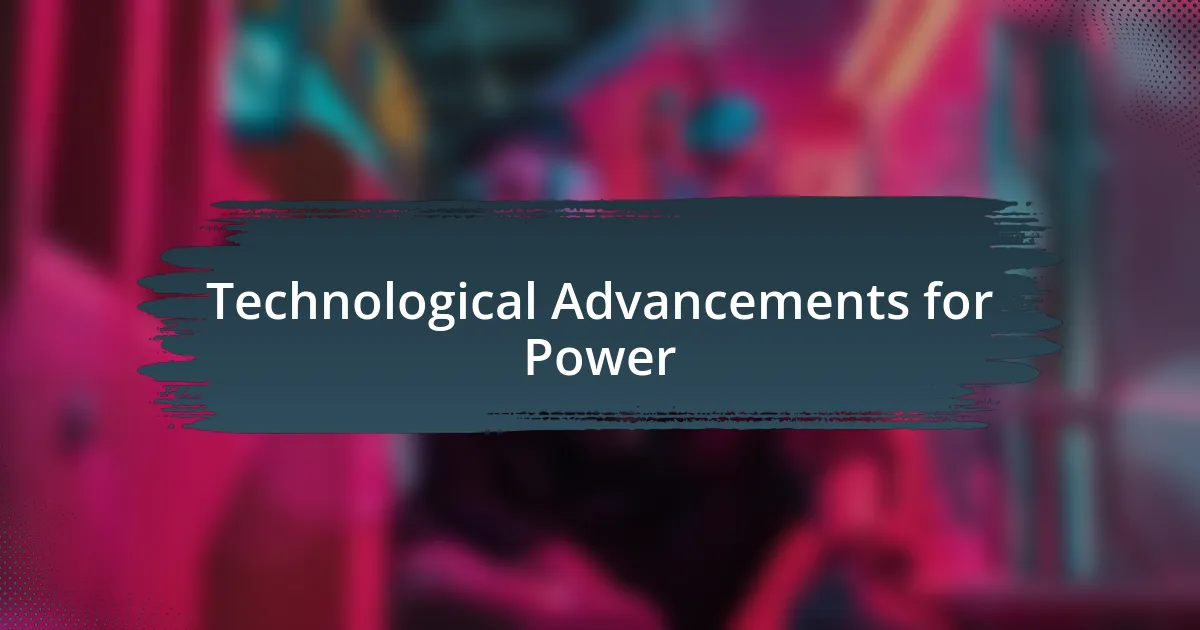
Technological Advancements for Power
When I think about the technological advancements that have revolutionized the concept of power in civilization, I can’t help but feel a surge of excitement. Consider renewable energy technologies like solar and wind power; they’re reshaping how nations harness power and engage with each other. It’s impressive to see countries pivoting towards sustainable energy sources, which not only enhances their energy independence but also positions them as leaders in the global arena.
Reflecting on my experiences attending clean energy conferences, I remember a presentation showcasing a groundbreaking battery storage solution that allows for the efficient storing and distribution of renewable energy. This innovation can empower entire communities, especially in developing nations where access to electricity can alter lives dramatically. Isn’t it inspiring to see how technology can bridge gaps and create opportunities for growth where they once seemed impossible?
Moreover, artificial intelligence is a game changer in power dynamics, especially in government and military applications. I once read a case study about a country that integrated AI in its resource management, leading to remarkable efficiency gains and enabling swift responses to crises. This not only gave that nation a competitive edge but also influenced its diplomatic relations, as it became a model for others to emulate. How can we overlook the potential of technology to redefine power structures and foster international cooperation?




